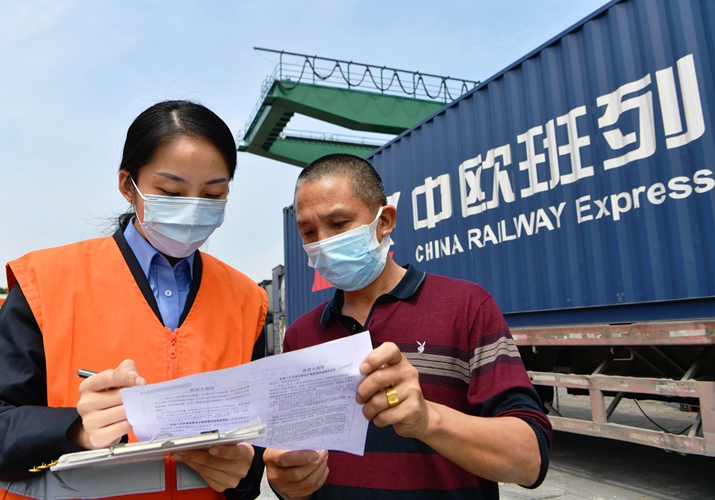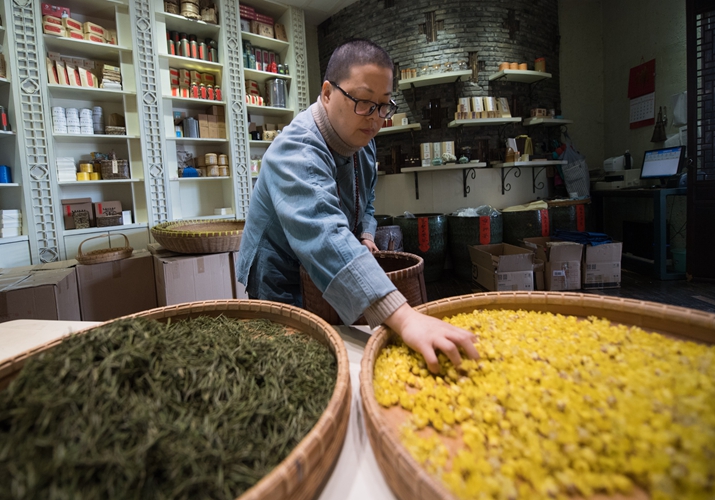| World |
| New China-EU agreement charts the course for easier trade exchanges | |
|
|
 A railway worker and a business representative review shipping procedures for cargos to be delivered to European customers at Haicang Station in Xiamen, Fujian Province in southeast China, on September 13 (XINHUA)
 Chinese President Xi Jinping co-hosted a China-Germany-EU leaders' meeting in Beijing on September 14 via video link with German Chancellor Angela Merkel, European Council President Charles Michel and European Commission President Ursula von der Leyen. Germany holds the EU's rotating presidency. Chinese President Xi Jinping co-hosted a China-Germany-EU leaders' meeting in Beijing on September 14 via video link with German Chancellor Angela Merkel, European Council President Charles Michel and European Commission President Ursula von der Leyen. Germany holds the EU's rotating presidency.The leaders reached an agreement on strengthening cooperation in major fields such as a bilateral investment treaty (BIT), climate change and the digital economy. They also announced the signing of a bilateral geographical indication (GI) deal, which demonstrates that China-EU cooperation is on track to make new progress. GI is a sign used on products that have a specific geographical origin and possess qualities or a reputation that are due to that origin. For example, if suppliers label cheese products not originating from Feta as Feta cheese, they infringe upon the legitimate rights of producers in the Greek region. There are many traditional food brands in China and the EU with unique histories, flavors and recipes. If some businesses imitate these foods and take advantage of their public recognition to promote the counterfeits, the interest of the authentic goods will be damaged. The establishment of the GI agreement will protect the agri-food sector's legitimate rights in both China and the EU. Multiple effects The agreement is China's first comprehensive, high-level bilateral agreement on GIs, and the first major trade pact between China and the EU in recent years, covering 100 product names from each side. The protected status in China means the names and descriptions of the European products cannot be used for similar goods. The Chinese GIs will enjoy the same status in the 27-member EU. With the improvement of living conditions, Chinese consumers, especially those in big cities, have a growing demand for imported food. Products such as French wine, Spanish ham and Italian pasta have gained popularity among this group. China is one of the largest markets for the EU's agri-food sector. Last year, China was the third destination for EU agri-food products, with exports totaling $17 billion. In 2009, the EU had an agri-food trade deficit with China, but in 2019, its surplus exceeded $10 billion. China is also the second destination of EU exports of products protected as GIs, accounting for 9 percent by value, including wines, agri-food products and spirit. Thus, it is important to establish a regime to protect the EU's GI rights in China and vice versa. EU member states welcomed the significant deal with China. The Portuguese Government released a statement saying the GI agreement reflected the EU and China's readiness to "honor the commitments made at previous summits and apply international rules as a basis for commercial relations." Adam Dunnett, Secretary General of the EU Chamber of Commerce in China, said the signing of the GI agreement showed that the EU and China can work together. The deal is also helpful for food-related cultural exchanges between China and the EU. For example, the protected status of Chinese food brands such as Pixian Dou Ban (Pixian Bean Paste), Anji Bai Cha (Anji White Tea) and Panjin Da Mi (Panjin Rice) will be good advertisement for them in the EU market. On the other hand, many Chinese consumers are not familiar with European wines, but some names listed in the GI agreement may soon become household names among them. More importantly, during the period of adapting to the new rules, enterprises, consumers and government officials from China and the EU can learn why the protected GIs matter to their original countries, presenting a good opportunity to expand the influence of their cultures.  A tea maker processes white tea at a workshop in Anji County, Zhejiang Province in east China, on January 18 (XINHUA)
Greater significance Beyond boosting agri-food trade, the signing of the GI agreement shows that China is determined to create a better business environment for foreign companies and enhance economic ties with the EU. For many years, the EU has called on China to strengthen protection of European companies' interests. The agreement demonstrated how China is absorbing some EU rules and regulations in order to prevent EU brands from counterfeits. It also means that the Chinese market is opening up wider to European food exporters, making it easier for them to reach local consumers. In fact, negotiations on the GI agreement were finalized in November 2019 during the Second China International Import Expo in Shanghai. The deal is an embodiment of China's will to fulfill its commitment to upholding the rules-based global economic order and protecting trading partners' legitimate rights and interests. In the future, China and the EU will work together to finish a series of economic cooperation deals. Leaders from both sides have announced that negotiations on BIT should be finished by the end of the year. The process will most likely face more difficulties and differences on issues involving market access, state-owned enterprises and a level playing field. However, the signing of the GI agreement indicates that China and the EU can address common concerns through negotiations and that China can accept the EU getting more benefits from a deal, since the EU has much more agri-food exports to China than China has to the EU. In addition, China will make more efforts to push forward BIT negotiations and combine China-EU economic cooperation with the process of opening up and reform. This year marks the 45th anniversary of the establishment of China-EU diplomatic ties. With the novel coronavirus pandemic leading to the worst recession of the world economy since World War II, the international community needs more cooperation to regain economic vitality instead of unilateral action, conflict or a blame game. Both China and the EU are major powers in the world economy, firm supporters of a multipolar world, and staunch upholders of a global order with the UN at the core. China-EU economic cooperation is not only mutually beneficial, but it also means that the two large markets in the world are more open and inclusive, and they can inject more momentum into the post-pandemic world economic recovery. The GI agreement is a good start in furthering bilateral cooperation and charting a course for China-EU relations. Both sides are willing to accommodate each other's interests and concerns, and they can formulate common rules for trade. It also shows that communication and negotiations can create more opportunities and push greater integration between the markets in China and the EU. The author is a research fellow with China Institutes of Contemporary International Relations (Print Edition Title: A Sound Path) Copyedited by Rebeca Toledo Comments to yanwei@bjreview.com |
|
||||||||||||||||||||||||||||
|